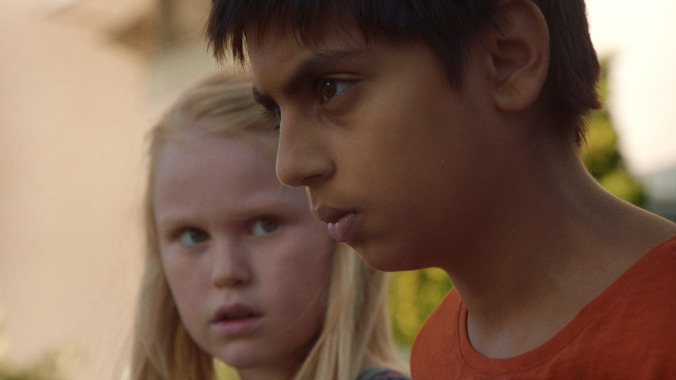The Innocents finds horror in super-powered children
Turns out an empowered 9-year-old with no empathy can be way scarier than a Multiverse of Madness

Into the discourse about whether or not a PG-13 rating is appropriate for Doctor Strange In The Multiverse Of Madness jumps The Innocents, a Norwegian movie about super powers in which children and animals are murdered. Consider this your only trigger warning: Eskil Vogt, writer of The Worst Person In The World, has made a film in which that unofficial title is not meant ironically. Angry, bitter kids who haven’t yet grown into empathy are the absolute worst, especially when they’re supernaturally enhanced.
At over two hours, the movie very slowly eases the viewer into a progressively more dangerous scenario, just as its kids gradually grow toward violence. Desperate to play at being superheroes, many children will often imagine themselves with minor powers that seem realistic, given the surroundings. And initially, those that appear here feel as potentially un-threatening as those of the Mystery Men. Ben (Sam Ashraf) can curve the path of a falling object with his mind. Aisha (Mina Yasmin Bremseth) can telekinetically empathize and communicate with the heavily autistic Anna (Alva Brynsmo Ramstad), whose own power is to keep a Frisbee or pot lid in a perpetual falling spin. Anna’s sister Ida (Rakel Lenora Fløttum) has no apparent powers, but it’s notable that Aisha cannot read her mind.
Ida may look movie-cute, but she’s no angel. Like many kids, she’d gladly stomp a worm to death, and she experiments with her sister’s uncommunicative state to pinch her has hard as possible, testing the pain threshold. But her new friend Ben is worse: He’s the kind of kid who’ll drop a cat down seven flights of stairs to see if it lands on its feet. It’s not that they’re malicious, so much as they haven’t developed the notion that other people and living things hurt like they do.
Together, their powers grow stronger, soon doing more than they ever could apart. This is a boon for Anna, whose ability to talk drastically improves. But it’s less so for Ben, whose turbulent anger and nascent psychic powers feed into each other, much to the detriment of anyone who so much as laughs inappropriately in his presence.
For as long as the movie is, it doesn’t waste time on needless exposition. No flashbacks explain why these kids act the way they do, and much is left to inference. When Ben, who clearly has Asian heritage, gets picked on by older Aryan boys, no one need ask why, or presume that this has never happened before. A photo with an absent father tells us much of what we need to know about Aisha, as her mottled facial pigmentation may suggest a target for bullying. All we need to know about Anna and Ida comes across in their relationship in the present. Ida’s only somewhat protective, finding the same amount of annoyance in her disabled sister that most any young girl does in a closely aged, abled sibling.
Likewise, when Ben becomes an actual danger, nobody has to spell out that no parent would believe a 9-year-old about a psychic friend preparing to do murder. The kids just assume it, as Vogt trusts in the audience to get it.
While the power of friendship is frequently a go-to in adventure and fantasy movies, The Innocents shows said power going both ways. Yes, heroes can hold hands and feel emboldened—the Guardians of the Galaxy literally did it to destroy their major villain—but running with bad friends can bring out the worst. Brightburn put this in more simplistic adolescent terms; for pre-teens, the fact that they don’t always know what they’re upset about makes the tension even more volatile. Even the term “innocent” goes two ways. On the one hand, they’re kids who haven’t yet experienced much of life. On the other, that innocence could also be described as an ignorance of consequences. They don’t know enough yet to know why they shouldn’t do what they want.
Cinematographer Sturla Brandth Grøvlen and composer Pessi Levanto work wonders to make a generic setting creepy as hell. Nondescript blocks of flats surrounded by woods offer an eerie blandness and emptiness, with a minimalist score that echoes Ben’s penchant for banging things repeatedly. The damnedest thing is we know what the threat is, so it’s not like something new and scary will come out of the woods—or so we think, at first. Vogt, like Ben, starts to cloud our minds at a certain point.
The four young leads are excellent, and clearly game for anything, with Ramstad a standout as someone who traverses levels of the spectrum depending on who’s in her head. At the same time, Ashraf’s journey from introverted to raw emotionality reminds us Ben’s in as much anguish as anybody. Childhood is hard, and childhood grudges run harder. The Innocents pulls no punches in turning that fact into horror.